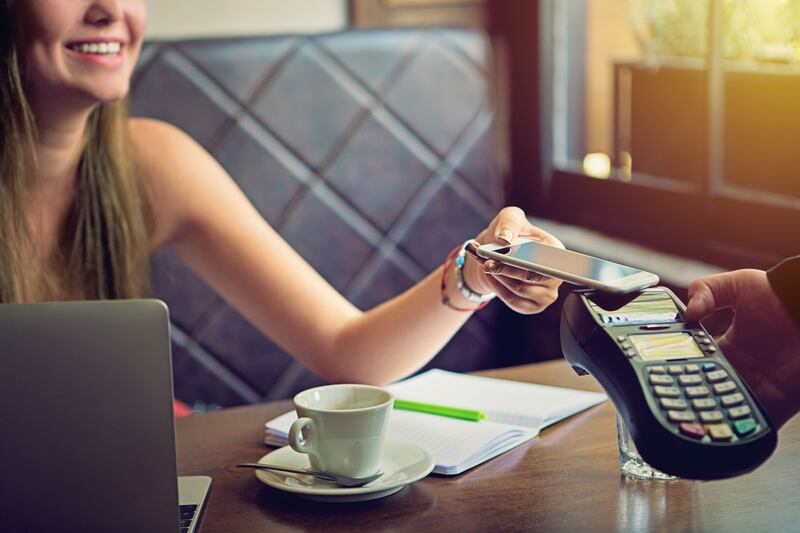When Abhijeet Bhose, an Indian area sales manager with a telecom company in the UAE, stopped using cash and credit and debit cards four years ago, little did he know just how far ahead of the curve he was.
While the Covid-19 pandemic accelerated the global adoption of digital payments and use of finance applications over the past 16 months, Mr Bhose, 38, says he first started using apps to manage his money in 2012, when he arrived in Dubai.
However, his decision to completely switch to digital wallets and contactless payments in 2017 was about convenience, aimed at helping him to better manage his financial responsibilities and save time.
“I have been using finance apps since 2012. I use them to remit money to my home country, for credit-card payments, insurance payments, local money transfers and I use NFC [near-field communication] payments for all kinds of shopping,” Mr Bhose says.

Heightened awareness about the spread of the Covid-19 virus via banknotes will mean consumers continue to embrace digital payments and the use of finance apps as the global economy begins to recover, consultancy Bain & Company said in a 2020 report.
By 2025, it estimates that the adoption of digital payments will accelerate by 5 to 10 percentage points globally.
It is a similar outlook for the finance app space, with downloads increasing by 55 per cent in the UAE and 73 per cent in Saudi Arabia in the first quarter of 2021 compared with the corresponding period last year, according to a June report by mobile marketing analytics platform AppsFlyer. Globally, users installed 4.7 billion finance apps between the first quarter of 2019 and the first quarter of 2021.
Financial services apps include those used for banking, mobile payments, money transfers, budget management, credit reports, credit scores, credit cards and other financial tools.
The Covid-19 pandemic directly affected how consumers interact with financial institutions and FinTech apps are in high demand, experiencing a 132 per cent surge globally in downloads in the past two years, the report adds.
Developing markets, where hundreds of millions of consumers are either unbanked or underbanked, dominated the number of finance app installations, according to the AppsFlyer report, with the average number of downloads 70 per cent higher than developed markets.
Countries such as India, Brazil and Indonesia made up almost half of the global download total, while the fastest-growing markets for finance app downloads are Egypt, Hong Kong, Turkey, South Africa and the US, the report adds.
“FinTech experienced rapid digital transformation over the last year, with the pandemic leading to a shift in mindset even for those who have been slow to adapt,” Shani Rosenfelder, head of content and mobile insight at AppsFlyer, says.
Consumers were forced to shift to technology to manage their finances and investments when Covid-19 movement restrictions were implemented in 2020, Vijay Valecha, chief investment officer at Century Financial in Dubai, says.
Even after the pandemic ends, for many people, the way they interact with their banks will have changed permanently because using technology to manage financial tasks helped to save time, he adds.
“It has been a fascinating year for mobile apps as the pandemic has led to unprecedented growth in many verticals,” Mr Valecha says.
“Aside from the fact that people are shopping more online, payment app usage has also increased, encouraging contactless payments in store. Users further grew comfortable using banking apps as transactions were at their fingertips. Secondly, the spike came from trading apps, which have also seen strong downloads due to increased millennial traders and market momentum.”
There is an increasing desire among people globally to better manage their finances, says Carol Glynn, founder of Conscious Finance Coaching. They are starting to actively manage their money and investing themselves, while before they would use the services of a financial adviser, she says.
“What people want from finance apps is ease of use. It helps them save time and their financial information is readily available when they want or need it. Convenience is key,” Ms Glynn says.
People are also increasingly downloading investment apps because of a heightened interest in stock markets, significant demand for trading driven by Robinhood and the huge growth of cryptocurrencies, which led consumers to invest and trade on the go, according to the AppsFlyer report.
Banking apps also recorded a surge in downloads, with account owners now expecting a seamless financial digital experience. Digital banking app downloads jumped 45 per cent globally, while traditional banks are picking up speed with a 22 per cent rise in installs between the last quarter of 2020 and the first quarter of 2021, the AppsFlyer report says.
“A combination of people going out less because of lockdowns and their finances coming under growing pressure led to a surge in banking app downloads. People using them more to keep a closer eye on their finances led to the surge in app installs,” Mr Valecha says.
The advantage of budgeting apps means that people can collate all their financial information from different accounts and store it on the one dashboard, Mr Valecha says. This helps them to keep an eye on their expenses, track their net worth, as well as monitor their debt and credit scores.
“Automatic alerts inform the user of important events. Apps can notify about impending due dates for bills, helping the user avoid missed or late payments that can tank credit scores,” he says.
Many budgeting apps can also detect fraudulent transactions on a user’s account, according to Ms Glynn. If, for instance, a large transaction is made and the user has set notifications for spending limits, it will notify them immediately, she says.
Budgeting apps also help users to track their financial progress towards specific goals, such as staying on track with budgets or how their investment portfolio is performing for their retirement plans. Many apps are also equipped to track how users' spending habits have changed over time, Mr Valecha says.
“No matter how prudent someone is, there might be occasions of insufficiency of funds, especially if people must pay rent, manage multiple loan repayments or medical emergency costs,” he adds.
“With the pandemic causing havoc on job security, people were prompted to opt for digital lending apps that allowed them to borrow bite-sized amounts and choose a comfortable tenure of repayment. However, trading and banking apps superseded the download of all other financial service apps.”
Mr Bhose, for instance, primarily uses banking apps, a trading app to monitor his cryptocurrency portfolio, digital wallets and mobile payment platforms such as Apple Pay and Samsung Pay. He recently downloaded a banking app to apply for a credit card and says it was a smooth experience.

“I use Emirates NBD or Mashreq apps for banking. With Emirates NBD mePay option, for example, you can send money to other account holders without adding them as beneficiaries. For India transactions, I use ICICI Bank and Google Pay,” Mr Bhose says.
He has also been using mobile trading app IQ Option for the past three years to trade in cryptocurrencies. However, he does not deal or invest in the asset class frequently. “I just use the app to monitor my investment and see how it’s performing,” he says.
Mr Bhose has not visited a branch in six months because his bank has moved almost all of its services online – from updating documents to setting up withdrawal limits and applying for new products or services.
“I occasionally keep very limited cash as some shops impose extra charges for transactions through cards,” Mr Bhose says. “High street shops in Meena Bazaar, Satwa and Deira in Dubai will levy charges [from 2.25 per cent to 2.5 per cent] on a credit card purchase, irrespective of the amount.”
Personal finance apps can make managing money easier. Consumers, however, may find it challenging to decide which app to use to stay on top of their finances. Choosing the best personal finance app centres largely on finding one that combines the features and benefits a person needs to manage their finances, as well as a positive user experience, Mr Valecha says.
“One factor to consider with personal finance apps is cost. While there are plenty of free budgeting and investing apps that offer financial help, some require a monthly or annual fee to download. Whether it makes sense to pay a fee can depend on how useful it ends up being,” he says.
Inexperienced investors should seek expert advice before using trading apps, Mr Valecha says. Do-it-yourself investing is unsuitable for new investors and trading based on influencer recommendations can lead to herd mentality and expensive mistakes, he warns.
“Unfortunately, I find people are not focused enough on data security,” Ms Glynn says. “This is an area we need to be very mindful of when downloading any app, but especially if we are sharing personal, sensitive financial data with the app.”
If a person plans to connect their bank, credit card or other financial information to an app, it is important to seek out ones that have specific security features, Ms Glynn says. Encryption and two-factor authentication can help protect your data, while it is important that you do not share your password with anyone, she says.
“Always use a password unique to the app, not one you use for other apps or websites. Using a combination of letters, numbers and symbols are most prudent,” she says.
People should also research the reputation of the app developer and carefully read the good and bad reviews. Other considerations include the age of the app, how established it is and its data-sharing terms and conditions, Ms Glynn says.
“Seek out independent reviews of the app, ones that are not paid for or sponsored by the developer. Speak to friends and family about apps they use, but always follow your own instincts when making the final decision on which finance app to use.”
How to choose the right finance app
- Study the cost. Whether it makes sense to pay a fee depends on how useful the app is;
- Understand the app's data security. If you plan to connect your bank, credit card or other financial information with the app, it is important to seek out specific security features such as encryption and two-factor authentication;
- Research the app developer's reputation;
- Consider how old and established the app is;
- Read the app's data-sharing terms and conditions;
- Seek out independent reviews of the app that are not paid for or sponsored by the developer.







